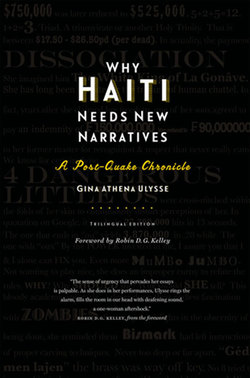Читать книгу Why Haiti Needs New Narratives - Gina Athena Ulysse - Страница 27
На сайте Литреса книга снята с продажи.
Оглавление15
If I Were President … Haiti’s Diasporic Draft (Part I)
August 27, 2010 / Huffington Post @ 10:28 a.m.
On January 18, when hip-hop singer Wyclef Jean held the press conference in New York City upon his return from the earthquake-devastated Port-au-Prince, he addressed the first of the two legal obstacles that threatened to bar him from participation in Haiti’s presidential elections.
After a heart-wrenching recount of his role in early rescue efforts and defense of accusations against his foundation, Yele Haiti, Jean held up his Haitian passport along with his registered alien card as cameras flashed. Those of us in the know read this moment as forecasting his eventual bid for the presidency.
In presenting proof of his Haitian citizenship, Jean publicly lessened the threat of Article 13 of the 1987 Constitution of Haiti, which states that one loses one’s Haitian nationality upon being naturalized as a citizen of another nation (and therefore is unable to seek the republic’s highest office).
Article 135, which requires habitual residency for five consecutive years, would become another matter for the presidential hopeful.
On Friday night, the electoral council disqualified Jean along with fourteen others—including his uncle Raymond Joseph (ambassador to the United States)—from the presidential race. Jean initially accepted this ruling, urging his supporters to stay calm and keep the faith, only to rescind his acceptance days later. As of Sunday night, Jean vowed to appeal the electoral council’s decision.
It’s certainly not the first time that diaspora Haitians have sought the presidency and challenged the electoral council, only to be stopped by Articles 13 and/or 135. In 2005, during the elections that legitimized the displacement of then president Aristide, two diaspora candidates, Samir Mourra and Dumarsais Simeus, sought the presidency. In a ping-pong match, Simeus and Mourra appealed and challenged the CEP’s ruling and found themselves on and off the ballot—that is, until they were eventually disqualified by a panel appointed by Haiti’s interim government.
Like Jean, Mourra and Simeus were wealthy businessmen who represented the interests of the elite and the international community. Unlike Jean, however, both were without popular support. They were also foreign nationals who had forfeited their Haitian citizenship.
To be sure, his nationality aside, Jean—a U.S. resident whom President Préval had named ambassador-at-large in 2007—has claimed that the residency requirement should not apply to him, given this post. If one were to follow that logic, there still remains a two-year discrepancy that must be accounted for. There is also the bigger ongoing issue of constitutional amendment.
It’s doubtful anything will happen with Jean’s appeal, since CEP decisions are usually final. Still, the discussion surrounding his candidacy has actually reopened an ongoing and unresolved debate concerning the diaspora’s role in Haiti and Haitian affairs.
Upon announcing his candidacy earlier this month, Jean stated he sought the presidency because he was being drafted into service.
Indeed, many of us who left Haiti behind for one reason or another have felt the call and responded to this diasporic draft in different ways since January 12. Some have chosen to be in the thick of it by moving back to Haiti to use their resources and skills. Others have stayed abroad to work behind the scenes, or on the fringes making periodic trips back. Not all of us have political aspirations. A lot of us are motivated by one thing: systemic changes in Haiti.
